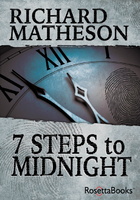Robinson opened the door for Molly almost before the carriage had fairly drawn up at the Hall, and told her that the squire had been very anxious for her return, and had more than once sent him to an upstairs window, from which a glimpse of the hill-road between Hollingford and Hamley could be perceived, to know if the carriage was not yet in sight. Molly went into the drawing-room. The squire was standing in the middle of the floor, awaiting her; in fact, longing to go out and meet her, but restrained by a feeling of solemn etiquette, which prevented his moving about as usual in that house of mourning. He held a paper in his hands, which were trembling with excitement and emotion; and four or five open letters were strewed on a table near him.
'It's all true,' he began; 'she's his wife, and he's her husband—was her husband—that's the word for it—was! Poor lad! poor lad! it's cost him a deal. Pray God, it was not my fault. Read this, my dear. It's a certificate. It's all regular—Osborne Hamley to Marie-Aimee Scherer,— parish-church and all, and witnessed. Oh, dear!' He sate down in the nearest chair and groaned. Molly took a seat by him, and read the legal paper, the perusal of which was not needed to convince her of the fact of the marriage. She held it in her hand after she had finished reading it, waiting for the squire's next coherent words; for he kept talking to himself in broken sentences. 'Ay, ay! that comes o' temper, and crabbedness. She was the only one as could—and I've been worse since she was gone. Worse! worse! and see what it has come to. He was afraid of me—ay—afraid. That's the truth of it—afraid. And it made him keep all to himself, and care killed him. They may call it heart- disease—O my lad, my lad, I know better now; but it's too late— that's the sting of it—too late, too late!' He covered his face, and moved himself backwards and forwards till Molly could bear it no longer.
'There are some letters,' said she: 'may I read any of them?' At another time she would not have asked; but she was driven to it now by her impatience of the speechless grief of the old man.
'Ay, read 'em, read 'em,' said he. 'Maybe you can. I can only pick out a word here and there. I put 'em there for you to look at; and tell me what is in 'em.'
Molly's knowledge of written French of the present day was not so great as her knowledge of the French of the Memoires de Sully, and neither the spelling nor the writing of the letters was of the best; but she managed to translate into good enough colloquial English some innocent sentences of love, and submission to Osborne's will—as if his judgment was infallible,—and faith in his purposes;—little sentences in 'little language' that went home to the squire's heart. Perhaps if Molly had read French more easily she might not have translated them into such touching, homely, broken words. Here and there, there were expressions in English; these the hungry-hearted squire had read while waiting for Molly's return. Every time she stopped, he said, 'Go on.' He kept his face shaded, and only repeated those two words at every pause. She got up to find some more of Aimee's letters. In examining the papers, she came upon one in particular. 'Have you seen this, sir? This certificate of baptism' (reading aloud) 'of Roger Stephen Osborne Hamley, born June 21, 183-, child of Osborne Hamley and Marie-Aimee his wife—'
'Give it me,' said the squire, his voice breaking now, and stretching forth his eager hand. '"Roger," that's me, "Stephen," that's my poor old father: he died when he was not so old as I am; but I've always thought on him as very old. He was main and fond of Osborne, when he was quite a little one. It's good of the lad to have thought on my father Stephen. Ay! that was his name. And Osborne—Osborne Hamley! One Osborne Hamley lies dead on his bed—and t'other—t'other I have never seen, and never heard on till to-day. He must be called Osborne: Molly. There is a Roger—there's two for that matter; but one is a good-for- nothing old man; and there's never an Osborne any more, unless this little thing is called Osborne: we'll take him here, and get a nurse for him; and make his mother comfortable for life in her own country. I'll keep this, Molly. You're a good lass for finding it. Osborne Hamley! And if God will give me grace, he shall never hear a cross word from me—never. He shan't be afeard of me. Oh, my Osborne, my Osborne' (he burst out), 'do you know now how bitter and sore is my heart for every hard word as I ever spoke to you? Do you know now how I loved you—my boy—my boy?'
From the general tone of the letters Molly doubted if the mother would consent, so easily as the squire seemed to expect, to be parted from her child; the letters were not very wise, perhaps (though of this Molly never thought), but a heart full of love spoke tender words in every line. Still, it was not for Molly to talk of this doubt of hers just then; rather to dwell on the probable graces and charms of the little Roger Stephen Osborne Hamley. She let the squire exhaust himself in wondering as to the particulars of every event, helping him out in conjectures; and both of them, from their imperfect knowledge of possibilities, made the most curious, fantastic, and improbable guesses at the truth. And so that day passed over, and the night came.
There were not many people who had any right to be invited to the funeral, and of these Mr. Gibson and the squire's hereditary man of business had taken charge. But when Mr. Gibson came, early on the following morning, Molly referred the question to him, which had suggested itself to her mind, though apparently not to the squire's. What intimation of her loss should be sent to the widow, living solitary near Winchester, watching and waiting, if not for his coming who lay dead in his distant home, at least for his letters? A letter had already come in her foreign handwriting to the post-office to which all her communications were usually sent, but of course they at the Hall knew nothing of this.
'She must be told!' said Mr. Gibson, musing.
'Yes, she must,' replied her daughter. 'But how?'
'A day or two of waiting will do no harm,' said he, almost as if he was anxious to delay the solution of the problem. 'It will make her anxious, poor thing, and all sorts of gloomy possibilities will suggest themselves to her mind—amongst them the truth; it will be a kind of preparation.'
'For what? Something must be done at last,' said Molly.
'Yes; true. Suppose you write, and say he is very ill; write to-morrow. I daresay they have indulged themselves in daily postage, and then she'll have had three days' silence. You say how you come to know all how and about it; I think she ought to know he is very ill—in great danger, if you like: and you can follow it up next day with the full truth. I would not worry the squire about it. After the funeral we will have a talk about the child.'
'She will never part with it,' said Molly.
'Whew! Till I see the woman I can't tell,' said her father; 'some women would. It will be well provided for, according to what you say. And she is a foreigner, and may very likely wish to go back to her own people and kindred. There's much to be said on both sides.'
'So you always say, papa. But in this case I think you'll find I'm right. I judge from her letters; but I think I'm right.'
'So you always say, daughter. Time will show. So the child is a boy? Mrs. Gibson told me particularly to ask. It will go far to reconciling her to Cynthia's dismissal of Roger. But indeed it is quite as well for both of them, though of course he will be a long time before he thinks so. They were not suited to each other. Poor Roger! It was hard work writing to him yesterday; and who knows what may have become of him! Well, well! one has to get through the world somehow. I'm glad, however, this little lad has turned up to be the heir. I should not have liked the property to go to the Irish Hamleys, who are the next heirs, as Osborne once told me. Now write that letter, Molly, to the poor little Frenchwoman out yonder. It will prepare her for it; and we must think a bit how to spare her the shock, for Osborne's sake.'
The writing this letter was rather difficult work for Molly, and she tore up two or three copies before she could manage it to her satisfaction; and at last, in despair of ever doing it better, she sent it off without re-reading it. The next day was easier; the fact of Osborne's death was told briefly and tenderly. But when this second letter was sent off, Molly's heart began to bleed for the poor creature, bereft of her husband, in a foreign land, and he at a distance from her, dead and buried without her ever having had the chance of printing his dear features on her memory by one last long lingering look. With her thoughts full of the unknown Aimee, Molly talked much about her that day to the squire. He would listen for ever to any conjecture, however wild, about the grandchild, but perpetually winced away from all discourse about 'the Frenchwoman,' as he called her; not unkindly, but to his mind she was simply the Frenchwoman— chattering, dark-eyed, demonstrative, and possibly even rouged. He would treat her with respect as his son's widow, and would try even not to think upon the female inveiglement in which he believed. He would make her an allowance to the extent of his duty; but he hoped and trusted he might never be called upon to see her. His solicitor, Gibson, anybody and everybody, should be called upon to form a phalanx of defence against that danger.
And all this time a little, young, grey-eyed woman was making her way; not towards him, but towards the dead son, whom as yet she believed to be her living husband. She knew she was acting in defiance of his expressed wish; but he had never dismayed her with any expression of his own fears about his health; and she, bright with life, had never contemplated death coming to fetch away one so beloved. He was ill— very ill, the letter from the strange girl said that; but Aimee had nursed her parents, and knew what illness was. The French doctor had praised her skill and neat-handedness as a nurse, and even if she had been the clumsiest of women, was he not her husband—her all? And was she not his wife, whose place was by his pillow? So without even as much reasoning as has been here given, Aimee made her preparations, swallowing down the tears that would overflow her eyes, and drop into the little trunk she was packing so neatly. And by her side, on the ground, sate the child, now nearly two years old; and for him Aimee had always a smile and a cheerful word. Her servant loved her and trusted her; and the woman was of an age to have had experience of humankind. Aimee had told her that her husband was ill, and the servant had known enough of the household history to know that as yet Aimee was not his acknowledged wife. But she sympathized with the prompt decision of her mistress to go to him directly, wherever he was, Caution comes from education of one kind or another, and Aimee was not dismayed by warnings; only the woman pleaded hard for the child to be left. 'He was such company,' she said; 'and he would so tire his mother in her journeying; and maybe his father would be too ill to see him.' To which Aimee replied, 'Good company for you, but better for me. A woman is never tired with carrying her own child' (which was not true; but there was sufficient truth in it to make it be believed by both mistress and servant), 'and if Monsieur could care for anything, he would rejoice to hear the babble of his little son.' So Aimee caught the evening coach to London at the nearest cross-road, Martha standing by as chaperon and friend to see her off, and handing her in the large lusty child, already crowing with delight at the sight of the horses. There was a 'lingerie' shop, kept by a Frenchwoman, whose acquaintance Aimee had made in the days when she was a London nursemaid, and thither she betook herself, rather than to an hotel, to spend the few night- hours that intervened before the Birmingham coach started at early morning. She slept or watched on a sofa in the parlour, for spare-bed there was none; but Madame Pauline came in betimes with a good cup of coffee for the mother, and of 'soupe blanche' for the boy; and they went off again into the wide world, only thinking of, only seeking the 'him,' who was everything human to both. Aimee remembered the sound of the name of the village where Osborne had often told her that he alighted from the coach to walk home; and though she could never have spelt the strange uncouth word, yet she spoke it with pretty slow distinctness to the guard, asking him in her broken English when they should arrive there? Not till four o'clock. Alas! and what might happen before then! Once with him she should have no fear; she was sure that she could bring him round; but what might not happen before he was in her tender care? She was a very capable person in many ways, though so childish and innocent in others. She made up her mind to the course she should pursue when the coach set her down at Feversham. She asked for a man to carry her trunk, and show her the way to Hamley Hall.
'Hamley Hall!' said the innkeeper. 'Eh! there's a deal of trouble there just now.'
'I know, I know,' said she, hastening off after the wheelbarrow in which her trunk was going, and breathlessly struggling to keep up with it, her heavy child asleep in her arms. Her pulses beat all over her body; she could hardly see out of her eyes. To her, a foreigner, the drawn blinds of the house, when she came in sight of it, had no significance; she hurried, stumbled on.
'Back door or front, missus?' asked the boots from the inn.
'The most nearest,' said she. And the front door was 'the most nearest.' Molly was sitting with the squire in the darkened drawing- room, reading out her translations of Aimee's letters to her husband. The squire was never weary of hearing them; the very sound of Molly's voice soothed and comforted him, it was so sweet and low. And he pulled her up, much as a child does, if on a second reading of the same letter she substituted one word for another. The house was very still this afternoon, still as it had been now for several days; every servant in it, however needless, moving about on tiptoe, speaking below the breath, and shutting doors as softly as might be The nearest noise or stir of active life was that of the rooks in the trees, who were beginning their spring chatter of business. Suddenly, through this quiet, there came a ring at the front-door bell that sounded, and went on sounding, through the house, pulled by an ignorant vigorous hand. Molly stopped reading; she and the squire looked at each other in surprised dismay. Perhaps a thought of Roger's sudden (and impossible) return was in the mind of each; but neither spoke. They heard Robinson hurrying to answer the unwonted summons. They listened; but they heard no more. There was little more to hear. When the old servant opened the door, a lady with a child in her arms stood there. She gasped out her ready-prepared English sentence,—
'Can I see Mr. Osborne Hamley? He is ill, I know; but I am his wife.'
Robinson had been aware that there was some mystery, long suspected by the servants, and come to light at last to the master,—he had guessed that there was a young woman in the case; but when she stood there before him, asking for her dead husband as if he were living, any presence of mind Robinson might have had forsook him; he could not tell her the truth,—he could only leave the door open, and say to her, 'Wait awhile, I'll come back,' and betake himself to the drawing-room where Molly was, he knew. He went up to her in a flutter and a hurry, and whispered something to her which turned her white with dismay.
'What is it? What is it?' said the squire, trembling with excitement. 'Don't keep it from me. I can bear it. Roger—' They both thought he was going to faint; he had risen up and come close to Molly; suspense would be worse than anything.
'Mrs. Osborne Hamley is here,' said Molly. 'I wrote to tell her her husband was very ill, and she has come.'
'She does not know what has happened, seemingly,' said Robinson.
'I can't see her—I can't see her,' said the squire, shrinking away into a corner. 'You will go, Molly, won't you? You'll go.'
Molly stood for a moment or two, irresolute. She, too, shrank from the interview. Robinson put in his word,—'She looks but a weakly thing, and has carried a big baby, choose how far, I did not stop to ask.'
At this instant the door softly opened, and right into the midst of them came the little figure in grey, looking ready to fall with the weight of her child.
'You are Molly,' said she, not seeing the squire at once. 'The lady who wrote the letter; he spoke of you sometimes. You will let me go to him.'
Molly did not answer, except that at such moments the eyes speak solemnly and comprehensively. Aimee read their meaning. All she said was,—'He is not—oh, my husband—my husband!' Her arms relaxed, her figure swayed, the child screamed and held out his arms for help. That help was given him by his grandfather, just before Aimee fell senseless on the floor.
'Maman, maman!' cried the little fellow, now striving and fighting to get back to her, where she lay; he fought so lustily that the squire had to put him down, and he crawled to the poor inanimate body, behind which sate Molly, holding the head; whilst Robinson rushed away for water, wine, and more womankind.
'Poor thing, poor thing!' said the squire, bending over her, and crying afresh over her suffering. 'She is but young, Molly, and she must ha' loved him dearly.'
'To be sure!' said Molly, quickly. She was untying the bonnet, and taking off the worn, but neatly mended gloves; there was the soft luxuriant black hair, shading the pale, innocent face,—the little notable-looking brown hands, with the wedding-ring for sole ornament. The child clustered his fingers round one of hers, and nestled up against her with his plaintive cry, getting more and more into a burst of wailing: 'Maman, maman!' At the growing acuteness of his imploring, her hand moved, her lips quivered, consciousness came partially back. She did not open her eyes, but great heavy tears stole out from beneath her eyelashes. Molly held her head against her own breast; and they tried to give her wine,—which she shrank from—water, which she did not reject; that was all. At last she tried to speak. 'Take me away,' she said, 'into the dark. Leave me alone.'
So Molly and the woman lifted her up and carried her away, and laid her on the bed, in the best bed-chamber in the house, and darkened the already shaded light. She was like an unconscious corpse herself, in that she offered neither assistance nor resistance to all that they were doing. But just before Molly was leaving the room to take up her watch outside the door, she felt rather than heard that Aimee spoke to her.
'Food—bread and milk for baby.' But when they brought her food herself, she only shrank away and turned her face to the wall without a word. In the hurry the child had been left with Robinson and the squire. For some unknown, but most fortunate reason, he took a dislike to Robinson's red face and hoarse voice, and showed a most decided preference for his grandfather. When Molly came down she found the squire feeding the child, with more of peace upon his face than there had been for all these days. The boy was every now and then leaving off taking his bread and milk to show his dislike to Robinson by word and gesture: a proceeding which only amused the old servant, while it highly delighted the more favoured squire.
'She is lying very still, but she will neither speak nor eat. I don't even think she is crying,' said Molly, volunteering this account, for the squire was for the moment too much absorbed in his grandson to ask many questions.
Robinson put in his word,—'Dick Hayward, he's Boots at the Hamley Arms, says the coach she come by started at five this morning from London, and the passengers said she'd been crying a deal on the road, when she thought folks were not noticing; and she never came in to meals with the rest, but stopped feeding her child.'
'She'll be tired out; we must let her rest,' said the squire. 'And I do believe this little chap is going to sleep in my arms. God bless him.'
But Molly stole out, and sent off a lad to Hollingford with a note to her father. Her heart had warmed towards the poor stranger, and she felt uncertain as to what ought to be the course pursued in her case.
She went up from time to time to look at the girl, scarce older than herself, who lay there with her eyes open, but as motionless as death. She softly covered her over, and let her feel the sympathetic presence from time to time; and that was all she was allowed to do. The squire was curiously absorbed in the child; but Molly's supreme tenderness was for the mother. Not but what she admired the sturdy, gallant, healthy little fellow, whose every limb, and square inch of clothing, showed the tender and thrifty care that had been taken of him. By-and-by the squire said in a whisper,—
'She is not like a Frenchwoman, is she, Molly?'
'I don't know. I don't know what Frenchwomen are like. People say Cynthia is French.'
'And she did not look like a servant? We won't speak of Cynthia since she's served my Roger so. Why, I began to think, as soon as I could think after that, how I would make Roger and her happy, and have them married at once; and then came that letter! I never wanted her for a daughter-in-law, not I. But he did, it seems; and he was not one for wanting many things for himself. But it's all over now; only we won't talk of her; and maybe, as you say, she was more French than English. The poor thing looks like a gentlewoman, I think. I hope she's got friends who'll take care of her,—she can't be above twenty. I thought she must be older than my poor lad!'
'She's a gentle, pretty creature,' said Molly. 'But—but I sometimes think it has killed her; she lies like one dead.' And Molly could not keep from crying softly at the thought.
'Nay, nay!' said the squire. 'It's not so easy to break one's heart. Sometimes I've wished it were. But one has to go on living—all the appointed days, as it says in the Bible.' But we'll do our best for her. We'll not think of letting her go away till she's fit to travel.'
Molly wondered in her heart about this going away, on which the squire seemed fully resolved. She was sure that he intended to keep the child; perhaps he had a legal right to do so;—but would the mother ever part from it? Her father, however, would solve the difficulty,—her father, whom she always looked to as so clear-seeing and experienced. She watched and waited for his coming. The February evening drew on; the child lay asleep in the squire's arms till his grandfather grew tired, and laid him down on the sofa: the large square-cornered yellow sofa upon which Mrs. Hamley used to sit, supported by pillows in a half- reclining position. Since her time it had been placed against the wall, and had served merely as a piece of furniture to fill up the room. But once again a human figure was lying upon it; a little human creature, like a cherub in some old Italian picture. The squire, remembered his wife as he put the child down. He thought of her as he said to Molly,—
'How pleased she would have been!' But Molly thought of the young widow upstairs. Aimee was her 'she' at the first moment.
Presently,—but it seemed a long long time first,—she heard the quick prompt sounds, which told of her father's arrival. In he came—to the room as yet only lighted by the fitful blaze of the fire.















